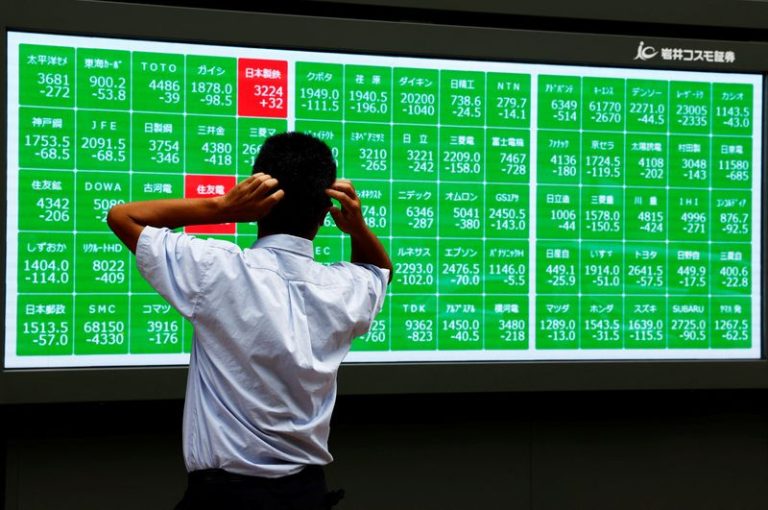By Tom Westbrook
SINGAPORE (Reuters) – Asian stocks hovered near two-week lows and the dollar hit milestone highs against the Australian and New Zealand dollars on Wednesday in the countdown to an expected U.S. interest rate cut.
In Japan, auto shares leapt on hopes that talks between Honda (NYSE:HMC) and Nissan (OTC:NSANY) heralded industry consolidation.
The S&P 500 edged 0.4% lower overnight but MSCI’s broadest index of Asia-Pacific shares outside Japan rose 0.5% in early trade.
Japan’s Nikkei was 0.3% lower but a record 22% jump in Nissan shares led gains in the sector as investors cheered the prospect of consolidation bringing down costs. Shares in Honda, whose market cap is five times larger than embattled Nissan, fell 1.6%.
Honda and Nissan – Japan’s second and third-biggest automakers, behind Toyota (NYSE:TM) – are in talks to set up a holding company, according to a person with knowledge of the matter, a move that would allow them to share more resources.
The companies said no merger had been announced but investors cheered the prospect of closer ties as margins have come under intense pressure from Chinese electric vehicles.
Mitsubishi Motors (OTC:MMTOF) jumped 14% while Mazda gained 4%.
Later in the day the Federal Reserve is expected to move the Fed funds rate window 25 basis points lower – from its current 4.5-4.75% range – but to offer a cautious outlook and probably lift its long-run interest rate projections.
Markets expect only about 50 basis points of further U.S. easing in 2025, leaving rates around 3.8%. That is much higher than Fed members’ median projection for rates at 3.4% at the end of next year and for a long-run neutral rate of 2.9%, which is driving speculation the Fed may move to meet the market.
“The market reaction is likely to focus on the communication and potential guidance for further cuts,” said David Doyle, head of economics at Macquarie.
“We foresee a hawkish shift in the dot plot, consistent with the movement in market expectations since the last update in September.”
Traders have been driving up U.S. yields and the dollar, with benchmark 10-year yields touching one-month highs around 4.4% overnight, before settling at 4.39%.
Moves in the Asia session were small but reflected the dollar’s broad strength, with the Australian dollar edging to a one-year low on the U.S. dollar at $0.6325 and the New Zealand dollar at a two-year low of $0.5748.[AUD/]
The euro was under pressure at $1.0502 and the yen dipped slightly to 153.6 per dollar. [FRX/]
HIGHER FOR LONGER
Bond markets, especially outside Europe, also seem to be girding for a higher interest rate future.
Pricing in Japan implies a 20% chance of a rate hike on Thursday – but that higher rates are a matter of time with more than 40 bps of hikes priced in by the end of 2025.
An unexpectedly big surge in British wages drove a wave of selling in gilts, a reduction in expectations for rate cuts and a lift for sterling, which at $1.2710 is flat for the year and the best performing G10 currency against the dollar.
Sterling is also within range of post-Brexit highs on the euro and the gap between 10-year gilt yields over German bund yields is its widest since 1990 and wider than the gap between U.S. rates and bunds.
“Given the political and growth woes of the Eurozone, we don’t expect sterling to weaken much against the euro,” said Kit Juckes, strategist at Societe Generale (OTC:SCGLY), though he doesn’t see the euro falling dramatically on the cross either.
In energy markets, European gas prices rebounded overnight on renewed concern about Russian supply via Ukraine, as a transit agreement expires at the end of the year.
Weak economies in Germany and China weighed on oil prices, keeping Brent crude futures at $73.34 a barrel.
The rise in yields has kept a lid on gold which was trading at $2,650 an ounce. Bitcoin hovered just below record highs at $105,393.

